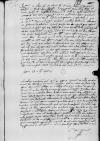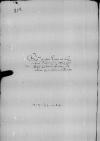Letter #2172
Ioannes DANTISCUS to Tiedemann GIESEHeilsberg (Lidzbark), 1539-07-04, postscript 1539-07-05
English register:
Dantiscus informs Giese that the King [Sigismund I Jagiellon] has agreed for the date of the [Royal Prussian] Diet to be moved to St. Michael’s Day [September 29]. He asks Giese to notify the neighbouring members of the Council, and he himself will notify the Voivode of Marienburg (Malbork) [Georg von Baysen (Jerzy Bażyński)], the Castellan of Gdańsk (Danzig) [Achatius von Zehmen (Cema)], and the councils of Elbing (Elbląg) and Gdańsk. He has already written to the Duke [Albrecht I von Hohenzollern-Ansbach] about the changed date.
Dantiscus sends Giese a letter received from the Vice-Chancellor [Samuel Maciejowski], describing the latest events.
The King made a decision on the Elbing castellany before the suggestions of Dantiscus and the Council members reached him. As a result of the support of the one who refused to sign the joint letter [Mikołaj Działyński, Castellan of Kulm (Chełmno)], the office was given to a less desirable candidate [Jan Sokołowski]. Dantiscus predicts further unfavourable developments and is worried about the future form of the Prussian Council.
Dantiscus asks Giese to admonish Doctor Nicolaus Copernicus, whom he has long respected highly as a person and a scholar, to dismiss the concubine [Anna Schilling] and not allow himself to be deceived any longer by Alexander [Sculteti], whom Copernicus prefers over other canons [of Ermland]. Dantiscus wants Copernicus to think the admonition is Giese’s own initiative.
| received [1539]-07-06 Manuscript sources:
Auxiliary sources:
Prints:
| ||||||||||||||||||||
Text & apparatus & commentary Plain text Text & commentary Text & apparatus
Reverendissimo in Christo Patri et Domino, domino
Reverendissime in Christo Pater et Domine, frater et amice carissime ac honoran(de) or honoran(dissime)⌈honoran(de)honoran(de) or honoran(dissime)⌉.
Salutem et fraternam commendationem.
cf.
Quid praeterea de novis, quae aguntur, ad me scriptum est, ex reverendi domini
Evenit, quod recto suspicabar futurum, quemadmodum et Dominationi Vestrae Reverendissimae cf.
Qui ut Dominationem Vestram Reverendissimam longissimo tempore sospitet prosperetque in omnibus, ex animo cupio.
Dat(ae) or Dat(um)⌈Dat(ae)Dat(ae) or Dat(um)⌉
Reverendissimae Dominationis Vestrae frater integerrimus
Postscript:
Audivi venturum ad Dominationem Vestram Reverendissimam eximium et multae eruditionis virum, dominum doctorem
Dat(ae) or Dat(um)⌈Dat(ae)Dat(ae) or Dat(um)⌉ V Iulii.


 BCz, 245, p. 202
BCz, 245, p. 202